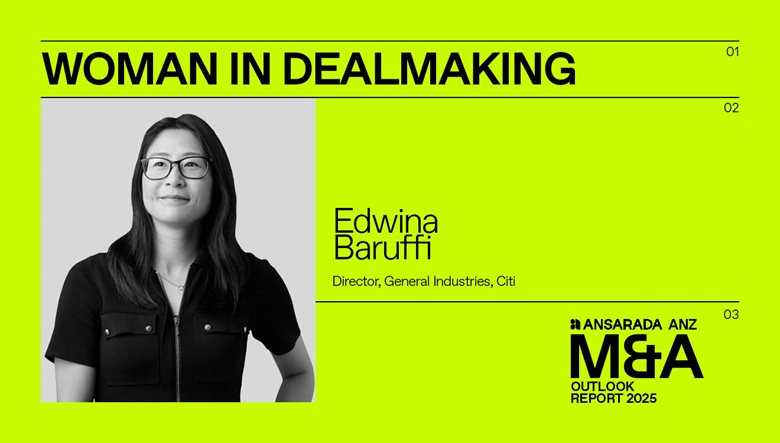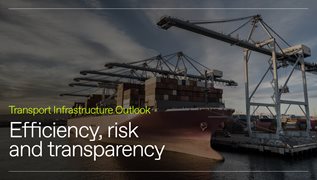Citi’s Edwina Baruffi: PE capital deployment driving M&A recovery
Edwina expects significant M&A volume increase as sponsors deploy capital and corporates divest non-core assets.
By AnsaradaWed Jun 11 2025Mergers and acquisitions, Advisors, Industry news and trends

Edwina Baruffi, Director, General Industries at Citi believes sponsors are looking to deploy capital. In this excerpt from our 2025 ANZ Women In Dealmaking M&A Outlook Report, which features insights from 12 of Australia’s leading female dealmakers, Edwina shares her outlook on sponsor activity, corporate divestments, and attractive investment sectors.
Corporates divesting non-core assets and a ramp up in private equity activity is expected to drive deals in a more normalized, post-COVID environment, as public market activity experiences a welcome boost.
“We expect a significant increase in M&A volumes, given improving economic conditions, slowing inflation and anticipated interest rate cuts. Everyone’s feeling a lot more comfortable. Sponsors have capital to deploy from recent fundraisings and many have held onto assets for longer than anticipated, with the expectation of an exit in the near-term,” says Edwina Baruffi, Citi Director, General Industrials.
“There is some investor pressure on sponsors to realize returns by exiting these portfolio assets. We are expecting to see sale processes start again, and with improving conditions, this may assist in bridging the value gap between the vendor and buyers. We’re finally coming out of this post-COVID period, moving into more normalized conditions. PE firms have cash to deploy and will continue looking to acquire assets.”
Amplified activity from private equity firms aside, Edwina says corporates are looking to divest non-core assets.
“There may be more IPOs coming this year as companies look to exit assets where there is no obvious trade buyer. Conversely, companies doing a public M&A takeover will need to offer a significant premium, given the prior muted IPO environment and overall decline in quality listed assets. Investors are expected to have a strong response if they are going to lose a key exposure,” she adds.
Industries that continue to be attractive are those with defensive and stable earnings.
“Given the uncertainties of the past few years, buyers are attracted to opportunities with consistent revenue and stable earnings, with tangible growth opportunities, such as those in healthcare, contracted services and infrastructure. Tech will continue to be attractive, given strong growth opportunities,” Edwina adds.
While there’s reason to be optimistic about the deal outlook, potential risks include changes to the geopolitical fabric such as the actions of the upcoming US Trump administration and potential new tariffs and low Chinese economic growth.
“Australia is closely connected to China in terms of trade flows, so any shift in this area could impact local corporates and businesses, especially if tariffs are passed on,” she says.
Turning to deal administration and management, Citi is rolling out AI pilots globally, such as technology that can summarize dense due diligence documents and pull out key insights.
Fulsome due diligence remains an integral part of the M&A process in a quiet deal market, although that could change as transactions ramp up.
“When assets start to become more competitive, investors might look for ways to streamline due diligence to make the process quicker, so they can get ahead of the competition,” Edwina notes.
While outbound cross border M&A activity may be more subdued this year, inbound deals are still likely to take place. “Buyers still see Australia as an attractive and stable market.”
Reflecting on her 12-year career at Citi, Edwina says the variability in the work in investment banking keeps her engaged. “Every day is different, working on a different client, task or problem. I enjoy the challenges of the job and helping companies solve problems and achieve their goals.”
Her team and the supportive and collaborative environment makes her job rewarding. “That’s what keeps me in investment banking – working with like-minded people who also want you to succeed.”
Edwina says there has been a growing focus on work-life balance during her career. “I can pick up my son from day care, then log back into work later if needed. It’s not just opportunities for women, working from home and flexibility for everyone helps in the sharing of home duties, which has enabled me to prioritize work in crucial situations.”
As ever, networking remains at the core of deal making. “You need to be in the flow of information and in front of clients to win work,” she says.


